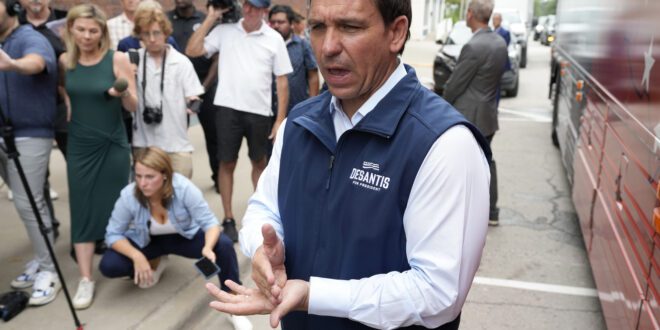Lately, voters sticking with frontrunners, bad news for DeSantis and other Republicans
Recently, voters have been showing a strong preference for sticking with the frontrunners in the 2024 Republican primary race. This is concerning for Florida Governor Ron DeSantis and the other Republicans who are seeking to challenge and potentially dethrone former President Donald Trump. The track record of past elections shows that the Republican polling leader in midsummer of the year before the election rarely loses the party’s nomination, making DeSantis’ task even more challenging.
There is only one instance where the Republican polling leader in midsummer went on to lose the party’s nomination. In 2008, Rudy Giuliani held the lead throughout the year, but John McCain surged in popularity and ultimately secured the GOP nomination. DeSantis’ campaign hopes to replicate McCain’s success, and recent staffing cuts indicate a similarity to McCain’s 2008 campaign. However, DeSantis faces an even more difficult challenge than McCain did, as Trump currently holds a commanding lead of 37 percentage points according to FiveThirtyEight’s latest average. A collapse by Trump would be unprecedented, and a turnaround by DeSantis would be equally remarkable.
To gain insight into the possibility of an upset in the primary race, it is worth examining past primary comebacks dating back to the 1970s. Here is a look at some historical examples:
2008 Republican primary
In the 2008 Republican primary, Rudy Giuliani led the national polls consistently throughout 2007. However, his lead was not as dominant as Trump’s is currently. Giuliani made the mistake of skipping Iowa and New Hampshire, focusing instead on Florida. This strategy backfired as he started slipping in the polls after the Iowa caucuses. John McCain, who won the New Hampshire primary, took the lead in the national polling average and maintained it until securing the nomination by defeating Giuliani, Mitt Romney, and Mike Huckabee in Florida.
DeSantis’ campaign team hopes to follow a similar path as McCain in 2008. They believe that a strong showing in Iowa could act as a catapult for DeSantis, just as it did for McCain.
1992 Democratic primary
In the 1992 Democratic primary, Mario Cuomo led the polls in the second half of 1991. However, he decided not to run, leaving the field open. Bill Clinton, who had officially entered the race in October 1991, gained momentum after a second-place finish in New Hampshire. Clinton went on to defeat Jerry Brown and Paul Tsongas, securing the nomination.
1988 Democratic primary
The 1988 Democratic primary saw Gary Hart leading in the polls over Michael Dukakis in the second half of 1987. However, Hart suspended his campaign from May to December of that year due to accusations of an extramarital affair. Jesse Jackson became the first African-American candidate to win a state’s nominating contest but remained below 20 percent in the polling average.
1976 Democratic primary
In the 1976 Democratic primary, George Wallace led the polls in the second half of 1975, followed by Hubert Humphrey and Ed Muskie. Jimmy Carter, a relatively unknown former governor of Georgia, started with only 0.5 percent support. However, Carter’s campaign gained traction, leaning into his unexpected rise, and he eventually secured the nomination.
1972 Democratic primary
The 1972 Democratic primary marked the first primary in the modern era. Ed Muskie led the polls in the second half of 1971 but faced challenges from Hubert Humphrey, Ted Kennedy, and George McGovern. McGovern’s well-executed campaign, led in part by Gary Hart, secured him the nomination by defeating both Muskie and Humphrey.
It is worth mentioning the 1979 Democratic primary, where Senator Ted Kennedy led President Jimmy Carter in the second half of the year. However, Kennedy struggled in the early primaries and caucuses, and Carter ultimately won the nomination.
While history provides some examples of primary comebacks, the current Republican primary race presents unique challenges. Donald Trump’s dominant lead and influence over the GOP make it difficult for any candidate, including Ron DeSantis, to mount a significant turnaround. However, as the past has shown, political landscapes can shift unexpectedly, and anything is possible in the world of politics.
 Mind Uncharted Explore. Discover. Learn.
Mind Uncharted Explore. Discover. Learn.




